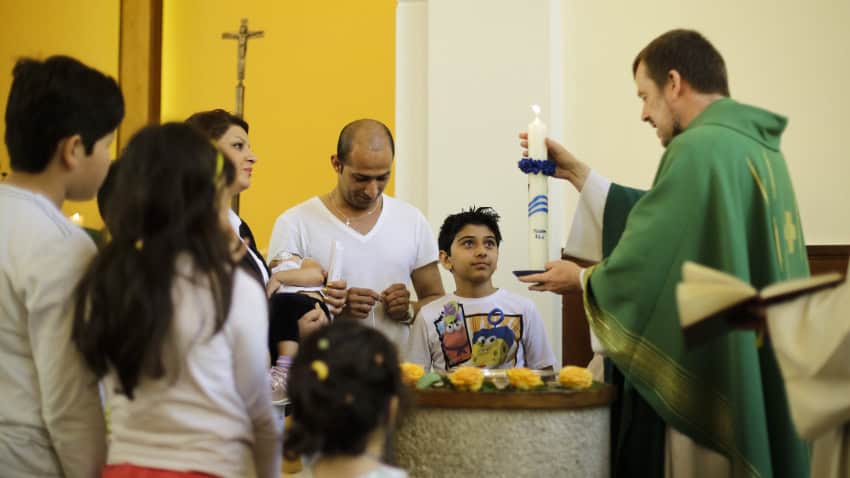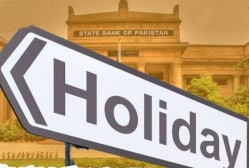LAHORE (Ali Zain) – Since the Syrian uprising against President Bashar al-Asad reshaped itself into a civil war and introduction of Islamic State militant group further devastated the country, thousands of people have been taking refuge in nearby countries such as Turkey, Jordan, Greece, Albania, Germany and France, among others.
The crisis has been spiraling out of control since 2015 as the number of asylum-seeking migrants in Europe has crossed 100,000.
Hundreds of them have also drowned in the Mediterranean, a result of over-loaded boats capsizing in the sea’s deep waters.
European countries had initially opened its borders to the refugees, even though only 46% of them were affected by the war in Syria.
However, the crisis deepened further when a group of Islamic State suicide bombers and attackers, who enetred Europe by pretending to be Syrian refugees, stormed the French capital in November 2015, killing 130 people.
In March this year, the Belgian capital was also hit by similar terrorist attacks in which a group associated with the Paris attackers, and trained by the Islamic State in Syria, was found to be involved.
Many Europeans have demanded a ban on Muslim refugees in Europe since the attacks, saying that only Christians should be accepted on the continent. Some European states such as Slovakia and Czech Republic have already announced that they will only be taking Christian refugees.
Republican US presidential candidate Donald Trump has also called for a complete ban on Muslim entry to United States, until conclusion of the war on terrorism.
Observers are now concerned that the situation may be forcing many Muslims to convert to Christianity just to gain asylum in European countries.
Recently, a report of the Daily Beast claimed that thousands of Muslim refugees, including Pakistanis, have started getting baptized as Christians in countries like Netherlands, Germany and Denmark in a bid to secure asylum in these countries.
The report questions whether these Muslims are converting to Christianity by choice or whether they are doing this under pressure to secure a safer existence in Europe.
Many in Europe also fear that potential terrorists could also use this knowledge by converting to Christianity before entry into Europe. The government of the Netherlands, in particular, is suspicious of new converts, with many observers saying a new convert to Christianity is actually more likely to have their asylum requests rejected.#
However, those associated with various Church establishments have welcomed the development, saying easy judgments on the true reason for the conversion should not be made.
Still, many are also concerned about the danger these newly-converted Muslims may have to face if their requests for asylum are rejected and they are deported out of the country.
Apostasy, the act of rejecting Islam as one’s religion after accepting it, is a punishable crime in many Muslim countries, which is justified by many of its supporters using a Quranic verse saying “Indeed, those who reject the message after their belief and then increase in disbelief – never will their [claimed] repentance be accepted, and they are the ones astray (3:90).”
In the presence of such hardline positions, the safety newly-converted Christians hailing from Muslim countries may be threatened if they are forced to return to their countries from Europe.
Encouragingly, however, some Quranic teachings may also provide relief. Such as “Unto you your religion, and unto me my religion (109:6),” “Whosoever will, let him believe, and whosoever will, let him disbelieve (18:29),” and “There is no compulsion in religion. The right direction is distinct from error (2:256).”
In an article published in The Washington Post, a number of verses were recently interpreted by Egyptian Islamic scholar Ali Gomaa to justify the recent spate of Muslim conversions in Europe. Gomaa, in his article, stated that if abandoning Islam is a sin, it will be punished by God on the Day of Judgment, in effect removing grounds for their prosecution upon return to their predominantly Muslim countries of origin.
Unfortunately, his minority position has received severe criticism around the globe, from both Muslim and non-Muslims alike. Ultimately, he issued a new statement in Arabic saying “What I actually said was that Islam prohibits a Muslim from changing his religion and it’s a crime that must be punished.”
However, another Islamic concept called “Taqiyya” has also been used by some scholars to justify the act of abandoning Islam in life-threatening situations. However, there is a lack of consensus on it among different sects of Muslims.
Those who believe the concept can justify certain kinds of conversions, point to a Quranic verse which states: “Whoever disbelieves in Allah after his belief… except for one who is forced [to renounce his religion] while his heart is secure in faith. But those who [willingly] open their breasts to disbelief, upon them is wrath from Allah , and for them is a great punishment. (16:106).”
They also rely on another, which says, “Allah does not impose blame upon you for what is unintentional in your oaths, but He imposes blame upon you for what your hearts have earned. And Allah is Forgiving and Forbearing. (2:225).”
However, many Muslim scholars believe that the concept was only applicable during the early days of Islam when its believers were few in numbers and under severe threat of persecution by the Arabian elite. They believe that the concept of Taqiyya is now irrelevant as there are over 1 billion Muslims in the world.
Unfortunately, due to the sensitivities at play, few scholars are ready to openly discuss this important concept, fearing censure by opponents and conservative elements in their countries. This explains why many of the judgments in favor of Taqiyya have been passed by scholars anonymously.
In the event that a large number of Muslims converts in Europe are sent back to their home countries, the concept of Taqiyya may be all that stands in the way of their successful reintegration into Muslim society and certain death.
Ahmad Shah Durrani, Associate Editor at Daily Pakistan Global, also contributed to this report.














